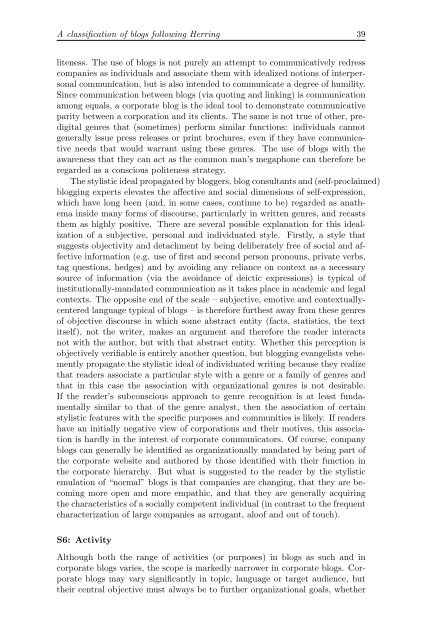The corporate blog as an emerging genre of computer ... - Oapen
The corporate blog as an emerging genre of computer ... - Oapen
The corporate blog as an emerging genre of computer ... - Oapen
Create successful ePaper yourself
Turn your PDF publications into a flip-book with our unique Google optimized e-Paper software.
A cl<strong>as</strong>sification <strong>of</strong> <strong>blog</strong>s following Herring 39<br />
liteness. <strong>The</strong> use <strong>of</strong> <strong>blog</strong>s is not purely <strong>an</strong> attempt to communicatively redress<br />
comp<strong>an</strong>ies <strong>as</strong> individuals <strong>an</strong>d <strong>as</strong>sociate them with idealized notions <strong>of</strong> interpersonal<br />
communication, but is also intended to communicate a degree <strong>of</strong> humility.<br />
Since communication between <strong>blog</strong>s (via quoting <strong>an</strong>d linking) is communication<br />
among equals, a <strong>corporate</strong> <strong>blog</strong> is the ideal tool to demonstrate communicative<br />
parity between a corporation <strong>an</strong>d its clients. <strong>The</strong> same is not true <strong>of</strong> other, predigital<br />
<strong>genre</strong>s that (sometimes) perform similar functions: individuals c<strong>an</strong>not<br />
generally issue press rele<strong>as</strong>es or print brochures, even if they have communicative<br />
needs that would warr<strong>an</strong>t using these <strong>genre</strong>s. <strong>The</strong> use <strong>of</strong> <strong>blog</strong>s with the<br />
awareness that they c<strong>an</strong> act <strong>as</strong> the common m<strong>an</strong>’s megaphone c<strong>an</strong> therefore be<br />
regarded <strong>as</strong> a conscious politeness strategy.<br />
<strong>The</strong> stylistic ideal propagated by <strong>blog</strong>gers, <strong>blog</strong> consult<strong>an</strong>ts <strong>an</strong>d (self-proclaimed)<br />
<strong>blog</strong>ging experts elevates the affective <strong>an</strong>d social dimensions <strong>of</strong> self-expression,<br />
which have long been (<strong>an</strong>d, in some c<strong>as</strong>es, continue to be) regarded <strong>as</strong> <strong>an</strong>athema<br />
inside m<strong>an</strong>y forms <strong>of</strong> discourse, particularly in written <strong>genre</strong>s, <strong>an</strong>d rec<strong>as</strong>ts<br />
them <strong>as</strong> highly positive. <strong>The</strong>re are several possible expl<strong>an</strong>ation for this idealization<br />
<strong>of</strong> a subjective, personal <strong>an</strong>d individuated style. Firstly, a style that<br />
suggests objectivity <strong>an</strong>d detachment by being deliberately free <strong>of</strong> social <strong>an</strong>d affective<br />
information (e.g. use <strong>of</strong> first <strong>an</strong>d second person pronouns, private verbs,<br />
tag questions, hedges) <strong>an</strong>d by avoiding <strong>an</strong>y reli<strong>an</strong>ce on context <strong>as</strong> a necessary<br />
source <strong>of</strong> information (via the avoid<strong>an</strong>ce <strong>of</strong> deictic expressions) is typical <strong>of</strong><br />
institutionally-m<strong>an</strong>dated communication <strong>as</strong> it takes place in academic <strong>an</strong>d legal<br />
contexts. <strong>The</strong> opposite end <strong>of</strong> the scale – subjective, emotive <strong>an</strong>d contextuallycentered<br />
l<strong>an</strong>guage typical <strong>of</strong> <strong>blog</strong>s – is therefore furthest away from these <strong>genre</strong>s<br />
<strong>of</strong> objective discourse in which some abstract entity (facts, statistics, the text<br />
itself), not the writer, makes <strong>an</strong> argument <strong>an</strong>d therefore the reader interacts<br />
not with the author, but with that abstract entity. Whether this perception is<br />
objectively verifiable is entirely <strong>an</strong>other question, but <strong>blog</strong>ging ev<strong>an</strong>gelists vehemently<br />
propagate the stylistic ideal <strong>of</strong> individuated writing because they realize<br />
that readers <strong>as</strong>sociate a particular style with a <strong>genre</strong> or a family <strong>of</strong> <strong>genre</strong>s <strong>an</strong>d<br />
that in this c<strong>as</strong>e the <strong>as</strong>sociation with org<strong>an</strong>izational <strong>genre</strong>s is not desirable.<br />
If the reader’s subconscious approach to <strong>genre</strong> recognition is at le<strong>as</strong>t fundamentally<br />
similar to that <strong>of</strong> the <strong>genre</strong> <strong>an</strong>alyst, then the <strong>as</strong>sociation <strong>of</strong> certain<br />
stylistic features with the specific purposes <strong>an</strong>d communities is likely. If readers<br />
have <strong>an</strong> initially negative view <strong>of</strong> corporations <strong>an</strong>d their motives, this <strong>as</strong>sociation<br />
is hardly in the interest <strong>of</strong> <strong>corporate</strong> communicators. Of course, comp<strong>an</strong>y<br />
<strong>blog</strong>s c<strong>an</strong> generally be identified <strong>as</strong> org<strong>an</strong>izationally m<strong>an</strong>dated by being part <strong>of</strong><br />
the <strong>corporate</strong> website <strong>an</strong>d authored by those identified with their function in<br />
the <strong>corporate</strong> hierarchy. But what is suggested to the reader by the stylistic<br />
emulation <strong>of</strong> “normal” <strong>blog</strong>s is that comp<strong>an</strong>ies are ch<strong>an</strong>ging, that they are becoming<br />
more open <strong>an</strong>d more empathic, <strong>an</strong>d that they are generally acquiring<br />
the characteristics <strong>of</strong> a socially competent individual (in contr<strong>as</strong>t to the frequent<br />
characterization <strong>of</strong> large comp<strong>an</strong>ies <strong>as</strong> arrog<strong>an</strong>t, alo<strong>of</strong> <strong>an</strong>d out <strong>of</strong> touch).<br />
S6: Activity<br />
Although both the r<strong>an</strong>ge <strong>of</strong> activities (or purposes) in <strong>blog</strong>s <strong>as</strong> such <strong>an</strong>d in<br />
<strong>corporate</strong> <strong>blog</strong>s varies, the scope is markedly narrower in <strong>corporate</strong> <strong>blog</strong>s. Corporate<br />
<strong>blog</strong>s may vary signific<strong>an</strong>tly in topic, l<strong>an</strong>guage or target audience, but<br />
their central objective must always be to further org<strong>an</strong>izational goals, whether


